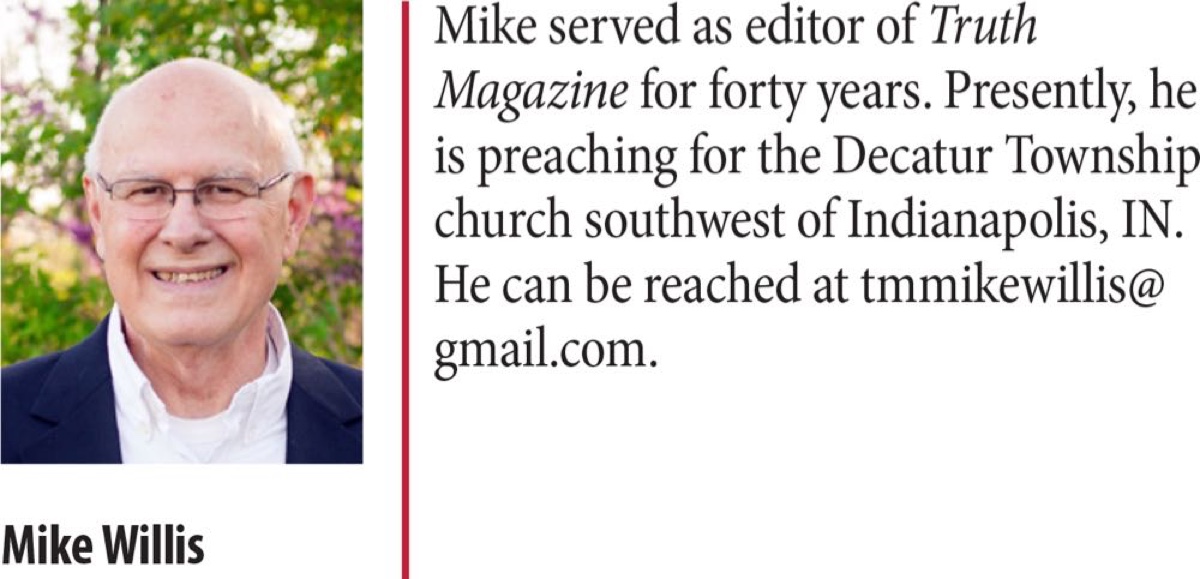By Mike Willis
Synopsis: The age old battle between God and Satan continues. So long as our adversary is effective in leading brethren to apostasy, there will always be a call for God’s remnant to show their faithfulness to His word.
For they are not all Israel, who are of Israel (Rom. 9:6).
The Hebrew word shearit, translated “remnant,” basically means “that which is left over, remainder” (HALOT, 1380) [see Note #1]. It can refer to what is left over from a tree or timber (Isa. 44:17), of the remainder of unnamed princes of the king of Babylon (Jer. 39:3), or of any other thing left over. The word is used 266 times in the OT; it is Isaiah’s favorite word to express the idea of the remnant. When used of a remnant of a people, it refers to those who survive a great catastrophe. Lester V. Meyer explains the concept, saying,
. . .the catastrophe purges the community of its impurities, and remnant is called to exemplary life as the people of Yahweh (Ezra. 9:13-14; Isa. 1:25-26; 4:2-4; 10:20). Thus, the appointment and rescue of the remnant, making possible the continuation of the life of the community, may be viewed as themselves constituting the saving activity of Yahweh (AYBD, 5:670).
Paul used the concept of the “remnant” (hupoleimma: “a relatively small surviving group, remnant,” BDAG, 1038) to describe those Jews who chose to believe in and obey the Lord Jesus; they are the “remnant” of Israel (Rom. 9-11) [see Note #2]. John describes the faithful saints in a less than faithful church at Thyatira who are the “rest” (Greek: loipos) or those who are “left” (Rev. 2:24); the “dead” church at Sardis had a few faithful to God (Rev. 3:4), although remnant language is not used to describe them. Those who are able to survive the onslaughts of the Great Dragon are called a “remnant” (Rev. 11:13; 12:17, from loipos, “those who were left” [BDAG, 602], translated “remnant” in KJV and “rest” in NKJV).
My assignment in this series of articles is to look at how the idea of remnant applies to the church today. That apostasy can occur within a church includes the idea of a remnant because these apostasies frequently divide Christians, with one group departing from the truth and the other group clinging to the word of Christ [see Note #3]. Paul’s closing words to the elders at Ephesus illustrate this:
Therefore, take heed to yourselves and to all the flock, among which the Holy Spirit has made you overseers, to shepherd the church of God which He purchased with His own blood. For I know this, that after my departure, savage wolves will come in among you, not sparing the flock. Also from among yourselves men will rise up, speaking perverse things, to draw away the disciples after themselves. Therefore, watch, and remember that for three years I did not cease to warn everyone night and day with tears (Acts 20:28-31).
To the young preacher, Timothy, Paul warned,
Now the Spirit expressly says that in latter times some will depart from the faith, giving heed to deceiving spirits and doctrines of demons, speaking lies in hypocrisy, having their own conscience seared with a hot iron, forbidding to marry, and commanding to abstain from foods which God created to be received with thanksgiving by those who believe and know the truth (1 Tim. 4:1-3).
Peter wrote, “But there were also false prophets among the people, even as there will be false teachers among you, who will secretly bring in destructive heresies, even denying the Lord who bought them, and bring on themselves swift destruction. And many will follow their destructive ways, because of whom the way of truth will be blasphemed” (2 Pet. 2:1-2). Using the example of the angels who sinned and were cast to hell, coupled with the ancient world in the days of Noah, and the people of Sodom and Gomorrah, Peter encouraged Christians that, just as God saved Noah and Lot, “the Lord knows how to deliver the godly out of temptations and to reserve the unjust under punishment for the day of judgment” (2 Pet. 2:9; cf. Jude).
The history of Christians in America who were determined to leave sectarian denominationalism in order go back to the Bible, being content to be Christians in the “one body” (Eph. 4:4), the church of God [see Note #4], illustrates the effect that doctrinal apostasy has on congregations. Though differences between the groups may appear small to outside observers in the beginning, historically those who moved away from Bible authority eventually embraced liberal attitudes toward the Bible (denying inspiration, rejecting the concept of the oneness of the church [which they deemed too exclusive], and embracing many of the cultural causes of the age [such as immodest dress, abortion, and homosexuality]). Historians estimate that 80-85% of all churches usually follow the apostate group. In that respect, the 15-20% who are left can truly be called a “remnant.” Frequently, they lost their church buildings and were compelled by conscience to move into rented facilities and start all over again.
Their history usually follows a pattern like this: (a) Zealous, committed Christians who made great sacrifices to worship and work together in accordance with divine revelation; (b) Years of struggling to grow a congregation from a handful of people meeting in economically stressed neighborhoods; (c) Finally, they grow large enough to build a building in a respectable neighborhood [see Note #5]; (d) A period of spiritual and numerical prosperity follows with the saints rejoicing in what Christ has done to bless their congregation; (e) This generation of saints begins to die off and the second generation moves into leadership positions, without recognizing what it took for the prior generation to succeed [see Note #6]; (f) The next generation becomes dissatisfied with the biblical way of doing things and becomes attracted to the “successful” leaders in contemporary denominations, aping them in their own local congregation. Within a few years, the difference in direction reaches critical mass, and the cycle repeats itself anew. The cycle in our churches resembles the cycle during the period of the judges, repeating itself in successive generations of mankind:
When all that generation had been gathered to their fathers, another generation arose after them who did not know the Lord nor the work which He had done for Israel. Then the children of Israel did evil in the sight of the Lord , and served the Baals; and they forsook the Lord God of their fathers, who had brought them out of the land of Egypt; and they followed other gods from among the gods of the people who were all around them, and they bowed down to them; and they provoked the Lord to anger (Judg. 2:10-12).
Because of the cyclical nature of history, there will always need to be a remnant—disciples of the Lord Jesus who are committed to following the revealed word of God, not being attracted to the latest and greatest bauble used by Satan to lure Christians away from God. Moses described the temptations that Israel experienced during the wilderness wanderings as a time when God led His people “to humble you and test you, to know what was in your heart, whether you would keep His commandments or not” (Deut. 8:2). I suspect similar events happen to every generation of mankind. Therefore, let us heed the lessons of history.
Note #1: For a brief look at the different Hebrew words for expressing the idea of “remnant,” see G. F. Hasel, “Remnant,” Interpreter’s Dictionary of the Bible, Supplementary Volume, 735-736.
Note #2: Paul quotes from Isaiah 10:22; 1:9; and 1 Kings 19:18 (see Rom. 9:27, 29; 11:4).
Note #3: Sometimes the apostasy is so complete that the entire congregation follows its leaders into disobedience.
Note #4: The term “church of God” is not intended to refer to the modern “Church of God” denomination, but rather to the church in the New Testament sense of all of those being saved in Christ (i.e., the universal church [Acts 2:47]), meeting together in local churches (congregations), and without any denominational machinery tying them together.
Note #5: Unfortunately, sometimes a remnant is unsuccessful in establishing a faithful congregation, because committed saints move away or die, and those who are left are not sufficiently committed to enable the local group to continue.
Note #6: Some of these second-generation leaders may even criticize their forebears, who endured the conflict in the local churches to salvage a remnant. They frequently do not understand the issues that caused the separation and are unwilling to allow preaching that reinforces commitment to Bible authority to prevent the cycle of apostasy from repeating itself.
Arndt, William, Frederick W. Danker, et al. A Greek-English Lexicon of the New Testament and Other Early Christian Literature (BDAG). Chicago: University of Chicago Press, 2000.
Koehler, Ludwig, Walter Baumgartner, et al. Hebrew and Aramaic Lexicon of the Old Testament (HALOT). Leiden: E.J. Brill, 1994-2000.
Meyer, Lester V. “Remnant.” The Anchor Yale Bible Dictionary (AYBD). Edited by David Noel Freedman. New York: Doubleday, 1992.


